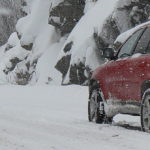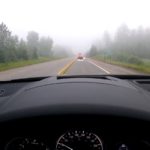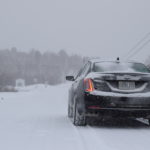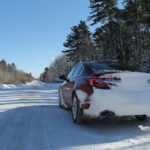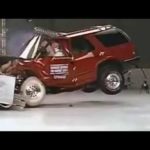Winter driving safety is important. We’re Canadians. We know this.
It’s winter. You should put on your winter tires, buy the usual array of flashy winter-driving products yelling at you from the weekly newspaper flyers, and be sure to scrape your windshield every time you set out so you can see things.
So, instead of the usual top-five winter-readiness tips, we offer the following: five things to avoid doing this winter where safety and peace of mind on the road are concerned.
DON’T travel with a near-empty tank
There are numerous, fairly-obvious reasons to keep your fuel topped up in wintertime. If you’re stranded, having a tank full of gas means you’ll be able to stay warm for longer until help arrives. If you’re travelling in unfamiliar territory in a snowstorm, it also reduces the possibility of running out of gas. But here’s the other thing: if your fuel supply has absorbed any water, which is probably has, that water will tend to be concentrated in the last bit of fuel left in your tank. As your tank empties, the water to fuel ratio in your tank gets more and more unfavorable, and there’s increased likelihood the water could freeze, causing a break-down or preventing your ride from starting. A full tank of gas, and some gas-line anti-freeze, is great for peace of mind.
DON’T have the double-decker grease-burger before you head out on a road trip
You’re planning a long-haul road-trip with the fam-jam that’ll see you at the wheel for many, many hours. Remember that the food you eat before and during that trip can have plenty to do with your energy and alertness levels.
Naturopath Dr. Jennifer Strong provides some advice on foods to avoid when you need prolonged levels of alertness at the wheel.
“Foods to avoid would be anything that is hard to digest, or anything high in simple sugars. This includes greasy, fatty meals, which take a lot of effort to digest. These can leave you feeling in need of a nap afterwards, so you body can focus its efforts on digestion.
High sugar foods are good for an immediate sugar rush, so they’re ok for an hour road trip. These are foods such as candy, chocolate, slushies, donuts, and so on. Afterwards, you’ll have a ‘sugar crash’, and feel even more tired than before.
Additionally, tryptophan, which is found in most meat and dairy products, is an amino acid known to make you feel a little drowsy if consumed in large quantities. For that reason, avoid gobbling down multiple double-cheeseburgers on the go.”
Remember that nothing replaces a good night’s sleep, and that caffeine, for all its energy-boosting goodness, can inhibit your body’s ability to absorb vitamin B, which is essential for proper energy level maintenance and digestion.
DON’T go Hollywood if you skid
You’re not Vin Diesel. Or Jeremy Clarkson. Or that guy from the Need for Speed movie. These guys use a sort of Hollywood driving style where they rip and thrash at the controls, since it looks nice on the camera. Thing is, in real life, this doesn’t really work, anywhere, and especially not in the winter. Suddenly wrenching the steering wheel at the first sign of a skid will instantly break the traction your front wheels have on the road, rendering your ride difficult to steer. Stabbing the brakes will quickly shift a lot of weight from the rear of the axle, making the car want to spin.
Hollywood-looking driving is a great way to get into a crash in winter. Remember that smooth, gradual and gentle inputs, not thrashy and panicked ones, are key to successfully staying on the
road and in control. Keep your eyes up and hands on the wheel at all times, for advanced warning that could make skidding less stressful and easier to handle smoothly.
DON’T be scared of the ditch
It’s foggy as all heck, the highways are slick, you should have probably pulled over an hour ago, and you’re tired, so you’re not watching your speed as closely as you should. Rounding a corner, you notice a multi-car pile-up taking place. You won’t be able to stop in time, and you’ve only got seconds to react. Solution? Don’t be afraid of the ditch. In this situation, your car will better protect you and those inside from a single impact with a ditch than multiple subsequent impacts in a pile-up. Get off the road, as far as you can, and wait for help to arrive. Intentionally ditching your car is safer than accidentally getting slammed into by a dozen more vehicles.
DON’T forget the emergency kit
You know it’s important. So, grab a big plastic bin and put in the vitals. Candles. Blankets. Snacks. An auxiliary charger for your cell phone. A bag or two of kitty litter or sand. A collapsible shovel. Some road flares. Having the proper equipment to stay warm, visible, fed and connected is key to success if you wind up having a break-down, accident or wind up becoming stuck. Sand is often underestimated as a fantastic traction aid, possibly coupled with some digging to free the underside of your ride if you get ‘hung up’. If you’re stranded off the roadway, remember to conserve fuel by running the engine a few minutes every hour or so, to keep the cabin warm. Clear snow from around your tailpipe periodically, which can reduce the likelihood of carbon monoxide entering the cabin.
